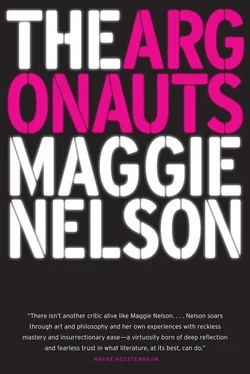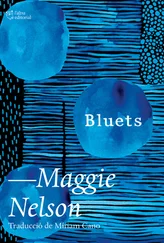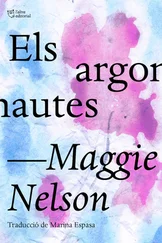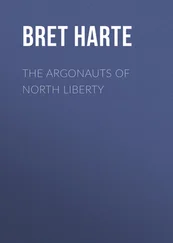For this reason I am tempted to call it a lasting happiness, but I know I won’t take it with me when I go. At best, I hope to impart it to Iggy, to allow him to feel that he created it, which, in many ways, he has.
Babies do not remember being held well — what they remember is the traumatic experience of not being held well enough . Some might read in this a recipe for the classic ungratefulness of children— after everything I’ve done for you , and so on. To me, at the moment anyway, it is a tremendous relief, an incitement to give Iggy no memory , save the sense, likely unconscious, of having once been gathered together, made to feel real.
That is what my mother did for me. I’d almost forgotten.
And now, I think I can say—
I want you to know, you were thought of as possible — never as certain, but always as possible — not in any single moment, but over many months, even years, of trying, of waiting, of calling — when, in a love sometimes sure of itself, sometimes shaken by bewilderment and change, but always committed to the charge of ever-deepening understanding — two human animals, one of whom is blessedly neither male nor female, the other of whom is female (more or less), deeply, doggedly, wildly wanted you to be .
After Iggy is released from the hospital post-toxin, we celebrate with one of our living room dance parties, just me and the three Irish guys, so called to honor the otherwise un-addressed genetic link each of them has to Irish stock. We play “Tightrope” by Janelle Monáe over and over again (after years of noise metal, Harry now also keeps abreast of the Top 40, so that he can discuss the finer points of the new Katy Perry, Daft Punk, or Lorde). Iggy’s big brother holds him by the armpits and spins him around in a wild circle while we scramble to make sure Iggy’s chubby legs don’t hit any windows or end tables. As one might expect for brothers seven years apart, they almost always play too rough for my liking. But he loves it! his brother says whenever I tell him to take the heavy faux-fur blanket off Iggy’s head for a moment, so we can be sure he hasn’t smothered. But for the most part, he’s right. Iggy loves it. Iggy loves playing with his brother and his brother loves playing with Iggy in ways I could never have dreamt. His brother especially loves dragging Iggy around his schoolyard, bragging about how soft his little brother’s head is to mostly preoccupied peers. Who wants to touch a really soft head? he yells, as if hawking wares. It stresses me out to watch them play, but it also makes me feel like I’ve finally done something unequivocally good. That I’ve finally done my stepson an unequivocal good. He’s mine, all mine , he says as he scoops Iggy up and runs off with him to another room.
Don’t produce and don’t reproduce, my friend said. But really there is no such thing as reproduction, only acts of production. No lack, only desiring machines. Flying anuses, speeding vaginas, there is no castration . When all the mythologies have been set aside, we can see that, children or no children, the joke of evolution is that it is a teleology without a point, that we, like all animals, are a project that issues in nothing .
But is there really such a thing as nothing, as nothingness? I don’t know. I know we’re still here, who knows for how long, ablaze with our care, its ongoing song.
Parts of this book appeared, in different forms, as a talk for Tendencies (a series in honor of Eve Kosofsky Sedgwick held at the Graduate Center at the City University of New York, cu-rated by Tim Trace Peterson); as a zine for A. L. Steiner’s 2012 Puppies and Babies installation (published by Otherwild); in the magazines jubilat, Tin House , and Flaunt; and in the anthology After Montaigne (University of Georgia Press, 2015). This book was supported throughout by a Literature grant from the Creative Capital Foundation, for which I remain grateful.
Special thanks as always to PJ Mark, for his shrewd intelligence and ongoing faith in me: I stand lucky and grateful. Thanks also to Ethan Nosowsky, for his profound editorial wisdom and support, and to Katie Dublinski. For their advice, assistance, and/or inspiration, I also wish to thank Ben Lerner, Eula Biss, Tara Jane ONeil, Wayne Koestenbaum, Steven Marchetti, Brian Blanchfield, Dana Ward, Jmy James Kidd, Macarena Gómez-Barris, Jack Halberstam, Janet Sarbanes, Tara Jepsen, Andrea Fontenot, Amy Sillman, Silas Howard, Peter Gadol, A. L. Steiner, Gretchen Hildebran, Suzanne Snider, Cynthia Nelson, Andrés Gonzalez, Emerson Whitney, Anna Moschovakis, Sarah Manguso, Jessica Kramer, Elena Vogel, Stacey Poston, Melody Moody, Barbara Nelson, Emily Nelson, Craig Tracy, and the Purple Team at the Children’s Hospital in Aurora, Colorado. To my Irish guys: thank you for your daily presence, support, and love. I’m so glad you found me.
In loving memory of those who departed during this book’s time: Phyllis DeChant (1938–2010), Eve Kosofsky Sedgwick (1950–2009), Lhasa de Sela (1972–2010), and Maximum Dodge (1993–2012). You are missed.
This book would not exist without Harry Dodge, whose intelligence, foxiness, vision, fortitude, and willingness to be represented have made this project, along with so much else, possible. Thank you for showing me what a nuptial might be — an infinite conversation, an endless becoming.
Note to the Reader: In the print edition of The Argonauts , attributions for otherwise unattributed text appear in the margins in grayscale. Because of limitations in the conversion of printed books to reflowable ebook files, there is not an adequate way to reproduce those marginal citations alongside the main text in the ebook. Therefore, all quoted text that is not attributed within the body of the text is listed below, with italics indicating the quoted material.
I stopped smugly repeating Everything that can be thought at all can be thought clearly and wondered anew, can everything be thought. — Ludwig Wittgenstein
Nuptials are the opposite of a couple. There are no longer binary machines: question-answer, masculine-feminine, man-animal, etc. This could be what a conversation is — simply the outline of a becoming . — Gilles Deleuze/Claire Parnet
(What is that triangle, anyway? My twat?) — Eileen Myles
Many feminists have argued for the decline of the domestic as a separate, inherently female sphere and the vindication of domesticity as an ethic, an affect, an aesthetic, and a public . — Susan Fraiman
When or how do new kinship systems mime older nuclear-family arrangements and when or how do they radically recontextualize them in a way that constitutes a rethinking of kinship? — Judith Butler
If a man who thinks he is a king is mad, a king who thinks he is a king is no less so . — Jacques Lacan
It’s not possible to live twenty-four hours a day soaked in the immediate awareness of one’s sex. Gendered selfconsciousness has, mercifully, a flickering nature . — Denise Riley
The bad reading [of Gender Trouble ] goes something like this: I can get up in the morning, look in my closet, and decide which gender I want to be today. I can take out a piece of clothing and change my gender: stylize it, and then that evening I can change it again and be something radically other, so that what you get is something like the commodification of gender, and the understanding of taking on a gender as a kind of consumerism…. When my whole point was that the very formation of subjects, the very formation of persons , presupposes gender in a certain way — that gender is not to be chosen and that “performativity” is not radical choice and it’s not voluntarism…. Performativity has to do with repetition, very often with the repetition of oppressive and painful gender norms to force them to resignify. This is not freedom, but a question of how to work the trap that one is inevitably in . — Butler
Читать дальше












